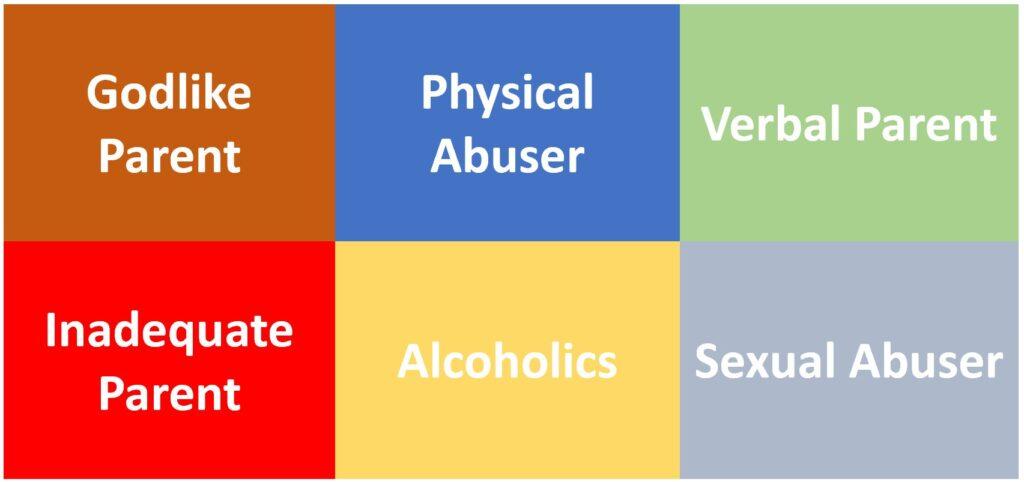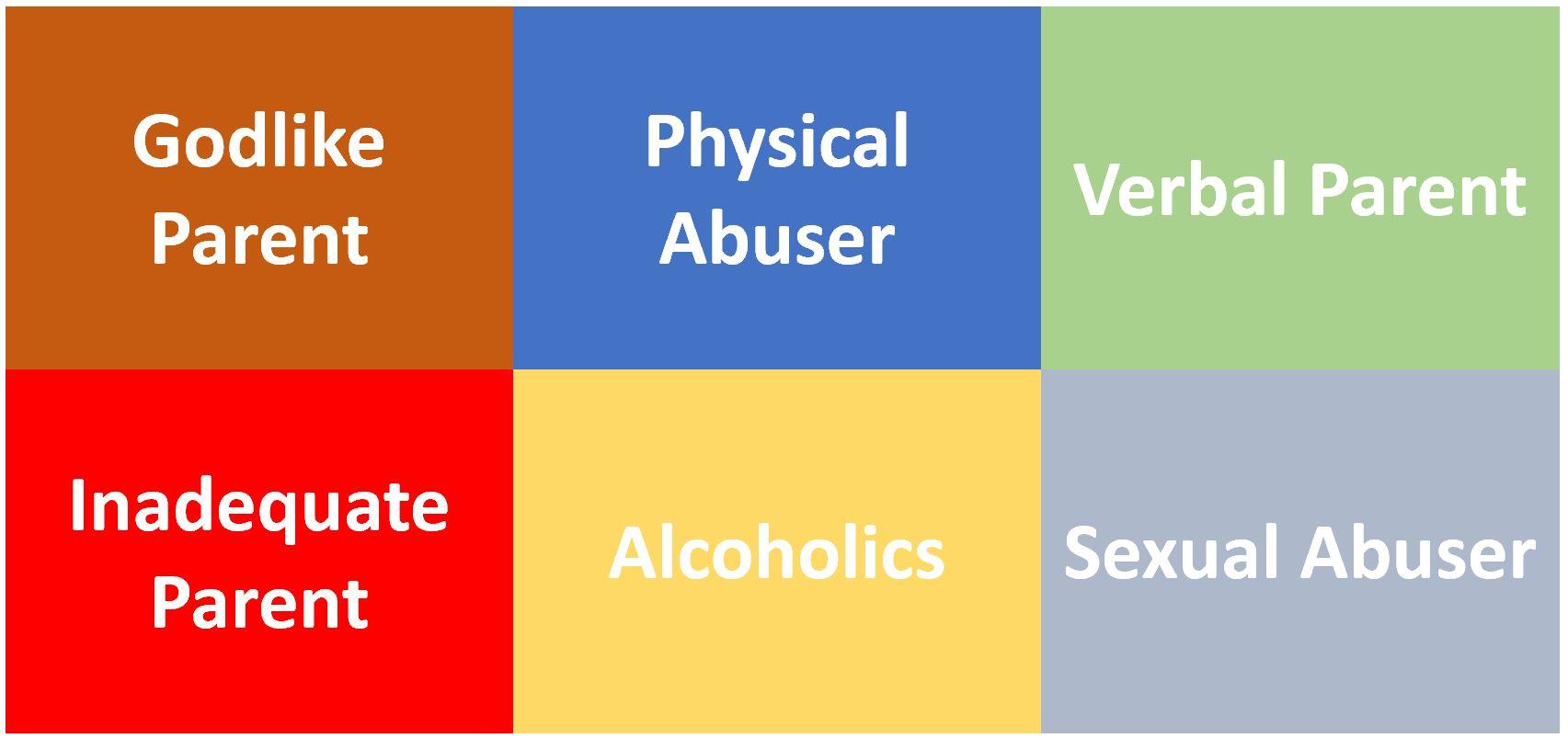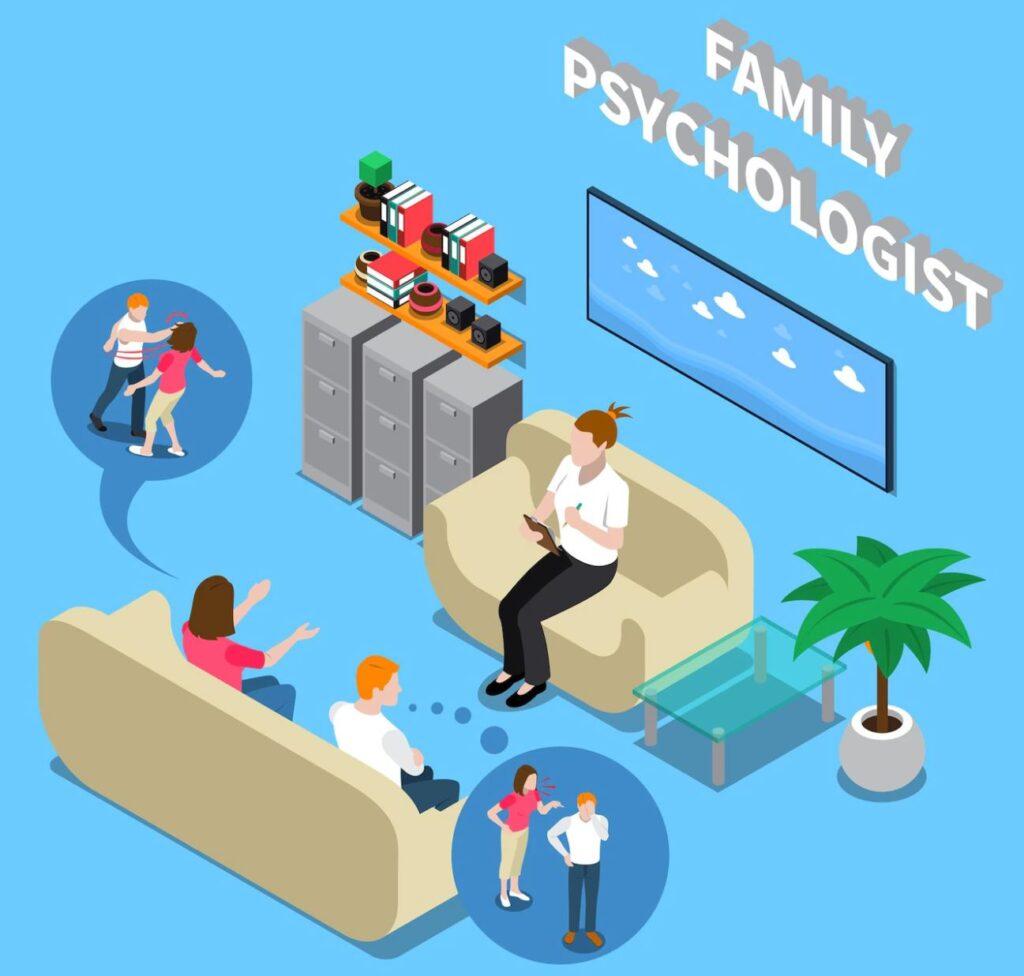The famous expression goes, ‘you cannot choose your family,’. This is true, and while this phrase is meant to be positive, that isn’t always the case. Sometimes, the family can hurt you more than any others. It’s not a particularly lovely topic and tends to be a bitter pill to swallow. But considering you have clicked on this article, you have already made a massive step forward by admitting there is a problem with someone in your family. Each family is different, meaning that every issue is unique. While there’s no magic answer to solve your family issues, several viewpoints and little pieces of information may be helpful to you in your situation. So, let’s get right to it.

Table of Contents
What is a Toxic Relationship in a Family?
Toxic relationships aren’t always easy to detect. But once you notice it, then it becomes impossible to unseen.
Relationship between adult and child
During our previous discussion of “10 Signs of Toxic Parenting and How to Deal with It“, we have listed three general characteristics of a toxic parenting relationship and six type of toxic parenting way.
- One-sidedness: In a healthy relationship, both parties feel they are being heard and meeting their needs. In a toxic relationship, however, one person always feels like they are not the priority.
- Imbalance of power: Both parties usually feel they have an equal say. In a toxic relationship, one person always feels like they are being controlled by the other.
- Lack of respect: When a healthy relationship, both parties feel equally treated. In a toxic relationship, one person always feels like they are being disrespected or belittled by the other.

Relationship between adult and adult
Now, if there is other family members between adults, such as couples, in-laws, grandparents, cousins, step relationships, there is no clear-cut method of spotting a toxic relationship. However, there are various signs that a toxic family member can exhibit. Here’s a list of possible red flags:
- They make you feel guilty for being sad or down
- They’re never satisfied with whatever you achieve, and they constantly move the goal posts
- Passive-aggressive behavior
- They try to create a wedge between you and other family members or friends
- Constantly gaslighting you
- Never taking responsibility and always blaming others for their mistakes
- Using threats casually when talking to you
- They always seem to be at the center of most family conflicts
- They often give you the silent treatment, including does not respond to your messages, email or do not return phone call intentionally.
- Lie constantly; even when they are caught out in their lie, they stand by it
If a family member exhibits one of the behavior patterns above, that doesn’t automatically mean that they are toxic. It’s more of a collective that can be used to identify a poisonous family member if these signs are present regularly.
Ultimately, it is about your feelings. If you feel down, sad, or disheartened more often than not when being around a particular family member, then there’s a problem that needs addressing.

Why Do Family Hurt You the Most?
The short answer is because you care. Most people care about their family members, even they don’t deserve your care. A few things tend to combine and create this ability to be hurt deeply by family members. Let’s take a look at some of the big ones:

We tend to be vulnerable around family
The world can be scary, and home is where we can shut out the world and be ourselves. It’s a place of safety and peace, so we let our guard down and behave more naturally and honestly. Since most people either live with family members or at least open their doors for the family to visit, family members get to see the most vulnerable side of us.
Naturally, if we open up to someone and show them our vulnerable side, we tend to feel closer to that individual. Unfortunately, if that individual is a toxic family member, it can lead to them causing you a level of pain that’s far more damaging than any pain caused by an outsider.
The relationship has been unhealthy for a long time
There are many ways that a relationship can be harmful. It’s also easy to say to ourselves, ‘it’s just the way they are,’ which almost enables or excuses a family member’s bad behavior.
To show an example, my father is a toxic and selfish individual, but it took me 22 years to realize that. Until then, I would excuse his behavior as a ‘part of who he is.’ As painful as that realization was, I wish I’d realized it much earlier. The moral of this example is not to try and justify unhealthy relationships.
Family is taken for granted
This last one is a big one. We are guilty of taking someone for granted, although most don’t do this intentionally. We assume our family will be there for us, no matter what.
But there is a big difference between those who do this innocently and those who do this maliciously. Somebody who takes you for granted maliciously might:
- Never be grateful for anything you do for them
- Never take your feelings into consideration
- Never give you an option when it comes to decision making
- They are never there when you are in need
- They never sacrifice or compromise
There are other signs, but the ones above are the easiest ones to spot. If you feel like a family member fits into the behavioral patterns above, you will probably need to talk with them.
How Do You Tell Your family that They Hurt You?
Please note, if the family member in question poses a physical threat to you, then DO NOT follow this approach. Seek professional and legal guidance. The following information is for helping NON VIOLENT and NON DANGEROUS situations.
There are numerous ways of talking to a family member who hurt you. Unfortunately, none of them are easy! But before we get into that, let’s look at things to take into consideration before you sit down for the talk.
- Make sure that you aren’t tired or hungry, hunger and tiredness will have an impact on your mood, making you less rational
- Plan what you want to say in great detail
- Be clear with yourself as to what your goal is
- Keep in mind that it’s a conversation, not an attack, so don’t turn it into a fight
- Be prepared for any possible outcome, the good and the bad
As far as confronting the individual goes, you should ensure that you are in a safe and comfortable place and try to minimize any distractions, tv, computers, games, etc… I would also advise you and the individual in question to conduct this conversation without others present. Bringing other people into the situation creates a feeling of being attacked from the viewpoint of the toxic family member.
Script example when family member hurt you
The words you use will depend on your specific situation, but here are a few ways you can start the conversation that may prove helpful:
“I don’t want to lose you as a family member, but I am struggle with our current relationship, and I want to talk about it so we can solve it together.”
“We need to talk. It’s not a nice topic, and I feel like you hurt me regularly. I don’t want to turn my back on you, but I also can’t continue on this path.”
The lines above are just examples, they don’t need to be used word for word, and they are simply a few ideas for getting the conversation going in a non-aggressive manner.

Tips during the conversation
As the conversation progresses, you must remain calm. Even if the person you are talking to is being rude and defiant, don’t stoop down to their level. Try to think calmly and rationally. Be mindful that the conversation may not end with the situation you’d hoped for, and you need to be ok with that.
Try to use ‘feel’ statements, such as “I feel upset when you…” or “When you do this, it makes me feel….” This way, you are ensuring that the individual you are talking to is fully aware of the impact his/her/their actions are having on you.
If the person you are talking to tries to storm off, don’t follow them. Just let them go. You have tried to extend a hand and do the right thing. If they walk away, then that’s up to them. Just be proud that you stood up for yourself and tried to do the right thing.
Finally, if the conversation goes well and the individual listens and holds their hands up, you must respect that and thank them for their honesty. Never do the “I knew it” and the “You should be sorry” phrases, as these phrases bring no good into the situation at all. It’s never easy to apologize, so when someone does, respect them for it and try to build off that positively. Try to move the conversation into the ‘So, what can we do to fix this situation phase, and discuss ways to move forward completely.
How Do You Forgive the Family Member Who Hurt you?
Forgiving and forgetting are two separate things, and that’s a sentence that I value dearly. You can forgive family in various ways, which I will go into some now. But just because you have forgiven somebody doesn’t mean you should try to forget their actions as that’s how we learn from our mistakes. Now, let’s discuss ways to forgive a family member who hurt you:
Time
Starting with the one that people like the least! The phrase ‘Time heals all wounds’ is complete nonsense! The term should be ‘Time helps wounds scab over!’ While time alone won’t help you forgive a family member, emotions such as anger and hatred tend to fade over time. Once the negative feelings have started to fade, you can begin to work on forgiving the family member in question.

Therapy
Therapy is an excellent way for you to discuss your feelings in a safe and supportive environment openly. Sometimes, just airing our frustrations can help us feel better. But with a supportive shoulder to lean on, you can learn to forgive a former toxic family member.
Rebuilding the relationship
Once a former lousy relationship has been exposed and the dust has settled, it’s easy to be overwhelmed with how to rebuild the relationship. Well, the best place to start is at the bottom!
What I mean by this is that it’s essential to rebuild the relationship from the ground up and NOT just paint over things. Start slow. Maybe meet just the two of you for coffee in a local cafe. One thing I would stay away from during the rebuilding process is alcohol. Alcohol is not great for decision-making and can lead to bad situations.
But by starting casually and slowly, it’s possible to rebuild a relationship. Just note that this won’t happen overnight! These things take time. So don’t rush!

When Should You Distance Yourself from the Family Member Who Hurt You?
There is no exact point at which you should distance yourself from a wrong family member, which will depend entirely on your specific situation. If severe abuse occurs in the relationship, you need to distance yourself immediately and seek professional and legal help.
Putting the extreme cases aside, you need to sum up how important they are to you and how much damage they are causing. If the harm outweighs their importance, it’s probably best to stand back a bit from that individual. This is vague advice, I know! But as I find myself repeating throughout this article, there’s no clear-cut answer that will apply to every situation. Every person’s situation is unique and therefore needs to be handled uniquely, these are merely guidelines.
So, I’d advise you to sit down and physically write out a list of good and bad regarding the individual in question. Keep the list safe and dispose of it when you are finished with it. But have two columns, one for good and another for bad. Sometimes it’s easier to see something when it’s written before you.

What Can You Do to Fix the Relationship if You Hurt A Family Member?
If you are the hurting part and you realize it. The following things you need do to fix things.
Firstly, if you know what you did caused the damage, tell your family that you know the problem and intend to fix it. Also, tell them that you may need help in becoming a better family member. Most people will appreciate the openness and do their utmost to help.
If you don’t know what is causing the damage, you need to find out! Sit down with someone who knows and ask them what the problem is. This will not be a pleasant conversation, but whatever is said, thank them for their honesty and follow the discussion with a clear outline of how you intend to solve the problem.
Related Reading: 14 Script Example to Tell Kids About Separation and Divorce
Secondly, fix your problem! This isn’t easy, but get the right help to change whatever the situation is. It helps with time management, substance abuse, anger management, financial, selfishness, parenting style and so on. This fix may come from counseling, medication, or others might work for you. It may be a long road ahead, but if it means you get your family back.
Related Reading: The Pragmatic Tips of Being a Single Parent
Finally, once you feel like you have things under control, it’s time for another sit-down conversation with your family. Just because you may have worked on your problems doesn’t mean that your family will trust you immediately. Show them what you have done to reach your goal, ask them if they have any concerns, and try to address them as best as possible. Re-build the relationship step by step, such as spend quality time together, watch movies, or express your love by flower or gift.
Related Reading:
- Mother’s Day Gift Idea For Wife Will Love & Warm (Simple Love)
- 20 Hilarious and Harmless April Fools’ Day Pranks for your husband or boyfriend
- 10 Best Movies for Father and Son

Final Thoughts from Pragmatic Lifestyle
Overall, it’s never easy when the family hurt you. But there are always options. That’s not to say that they are easy options, but as mentioned throughout this article, family is worth it, more often than not!
If you have made the brave decision to confront a toxic family member or maybe even taken the bold move of turning your back on a family member, then I highly recommend you reach out for assistance. If you feel like you have nowhere to turn, then take a look here. Just remember, you are not alone.

About Me
Hi, there. I am Lin. Together with my husband and two kids, we live in the beautiful Netherlands in Europe. I am dedicated to self-development, creating quality time for the whole family, and fully supporting kids with their potentials with all I have learned from engineering, MBA, and 10+ years of working experience in the energy sector.






7 Comments
Comments are closed.